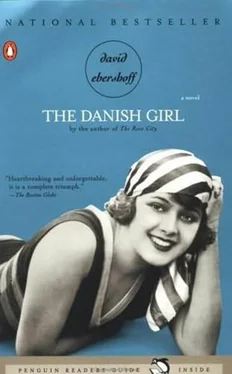“How’re you feeling today?” Dr. Hightower would ask.
“A little better,” Teddy would say, honestly believing it, or unaware that it was possible to answer anything else. Dr. Hightower would nod and check something off on a chart in his file. Greta would excuse herself to make a call over to the grovehouse, where a load of orange pickers up from Tecate was expected any hour. And with the receiver at the nurse’s station pressed against her ear, Greta would make a second call to Richardson, saying only, “He’s getting worse.”
Her mother visited, usually in the afternoons when Teddy would have his one good hour. Greta and Teddy sat silently while Mrs. Waud rattled on about opening up the beach house in Del Mar, or about the telegram from Greta’s father, who was reporting even more enthusiastically than the newspapers that the end of the war was near. Greta silently hoped her mother would intervene in that way only she could: throwing open the drapes and nudging Teddy out of bed and into a hot mineral bath, bringing a cup of tea laced with bourbon to his lips. “Alrighty, now let’s get you well!” Mrs. Waud would say, rubbing her hands together and pushing the loose strands of hair back over her ears. “Enough of this tuberculosis nonsense!” Mrs. Waud would say-or at least Greta secretly hoped she would say. But Mrs. Waud never did; she left Teddy to Greta. She would pull on her gloves at the end of the visit and then kiss Teddy’s forehead through her surgical mask and simply say, “I want you sitting up the next time I come.” She would then slit up her eyes and look over at Greta. In the corridor outside the room, Mrs. Waud would remove her mask and say, “Make sure he’s getting the best care, Greta.”
“He won’t see Richardson.”
“He simply must.”
And Greta would telephone Richardson again, giving Teddy’s latest status.
“Yes, I know,” Dr. Richardson would say. “I’ve consulted with Dr. Hightower. To be honest with you, I’m not sure there’s anything more I could do for him. We’ll just have to wait and see.”
When Carlisle drove down from Stanford to visit, he pulled Greta aside and said, “I don’t like this Hightower. Where’d he come from?” She explained that he was assigned by the sanitarium, but Carlisle interrupted her: “Maybe it’s time to bring in Richardson.”
“I’ve tried.”
“Is there anything I can do?”
She thought about this. She heard Teddy cough on the other side of the door. The wire springs of the bed trembled. There was a deep wheezing gasp for breath. “I’ll have to think about it. I’m sure there’s something, yes. I’ll just have to think about it.”
“You know how serious this is, don’t you?” Carlisle said, taking her hand.
“But Teddy’s strong,” she said.
Later that afternoon, when Carlisle had left, and the sun was sliding over the foothills, and the purply shadows were falling like blankets on the canyons of Pasadena, Greta took Teddy’s cold hand. The pulse on the underside of his wrist was faint, and at first she didn’t think it was there at all. But it tapped lightly, infrequently. “Teddy?” she said. “Teddy, can you hear me?”
“Yes,” he said.
“Does it hurt?”
“Yes.”
“Do you feel any better today?”
“No,” he said. “I’m afraid I’m worse. Worse than I’ve ever been.”
“But you’ll be getting better. Teddy? Do me a favor? I’ve called Richardson. He’s coming by in the morning. Please let him take a look at you. That’s all I’m asking. He’s a good doctor. He saved me when I was little and had the chicken pox. I had a fever of a hundred and six, and everyone, including Carlisle, had written me off, and here I am today as strong as anyone, with nothing left of that damn disease except for this little scar.”
“Greta, dear?” Teddy said, the tendons in his throat leaping. “I’m dying, dear. You know that, don’t you? I’m not going to get any better.”
And to tell the truth, she didn’t know that, not until just then. But of course he was dying; he was closer to dead than alive: his arms were thin and loose with yellowing flesh, his eyes infected, his lungs sponges so heavily soaked with blood and sputum that they would sink straight to the bottom of the Pacific. And his bones, that was the cruelest part: his bones were sopped; there was a wet living fire gnawing away at his bones. She thought of the pain he must be bearing but about which he never complained. It nearly killed her to have her husband in pain. “I’m sorry,” Teddy said.
“Whatever for?”
“For leaving you.”
“But you’re not leaving me.”
“And I’m sorry for asking you to do this,” he said.
“Do what? What are you talking about?” She felt a panicky film of sweat spread across her back. The room was warm with the effluvia of malady. She should crank open the window, she was thinking. Give poor Teddy some fresh air.
“Would you help me with it?”
“With what?” She didn’t understand him, and she thought about calling Richardson and reporting that Teddy was now speaking nonsense. An ominous sign, she knew Richardson would say, his drawl heavy on the phone line.
“Take that pillow… the rubber one. Put it over my face for just a little bit. It won’t take long.”
She stopped. Now she understood. A final request from her husband, whom she wanted to please more than anyone in the world. More than anything she wanted him to leave this world still in love with her, gratitude his final memory. A rubber pillow sat in the rocking chair; Teddy was trying to lift his hand to point.
“Just hold it against my face for a minute or two,” he said. “It’ll be easier that way.”
“Oh, Teddy,” she said. “I can’t. Dr. Richardson will be here in the morning. Wait until then. Let him take a look at you. He might know what’s next for you. But just hold on till then. Please stop talking about that pillow. Please stop pointing at that pillow.” The sweat was collecting at the small of her back, and on her blouse beneath her breasts. It was almost as if she had a fever, her forehead slick, a drop of sweat slipping past her ear.
She turned the window crank and felt the cool air. The pillow was black, with thick edges, and smelled like a tire. Teddy was still pointing at it. “Yes,” he said. “Bring it over here.” She touched it, its skin thick like a hot-water bottle. It was limp, only half-filled with air. “Greta, my dear… one last thing. Just press it against my face. I can’t take this any longer.”
She picked up the pillow and held it to her chest, the rubbery smell filling her. She couldn’t do it. Such a horrible way to die, beneath this smelly old thing, rubber the last scent of your life. Worse than what was going to kill him, she told herself, fingering the pillow’s elastic edge. Worse than anything she’d ever imagined. No, she couldn’t do it, and she threw the pillow out the window, the black pad falling like an injured raven into the Arroyo Seco below.
Teddy parted his lips, his tongue appearing. He was trying to say something, but the effort overcame him and he fell asleep.
Greta moved to his side and held her palm in front of his mouth. The breath was no stronger than the wake of a butterfly. As evening fell all around, the halls of the sanitarium became silent. The blue jays made a last dash in the ponderosa outside Teddy’s window, and Greta took his cold moist hand. She could no longer look at him, turning her head to the hand-crank window, watching the Arroyo Seco become a black pit. The San Gabriel Mountains turned into black silhouettes of something large, something black and faceless looming over the valley where the Wauds lived among the canyons and the orange groves, and where Greta was holding her breath until she thought she would pass out; and when she finally gasped for air and blotted the tears with her cuff, she dropped Teddy’s hand. Again she placed her palm beneath his nose, and then, in the night, she knew, by his own will, Teddy Cross was gone.
Читать дальше












